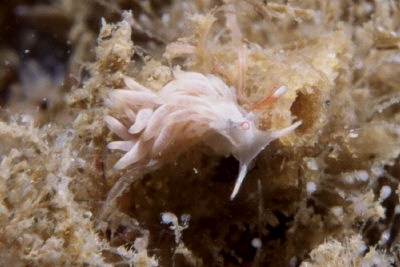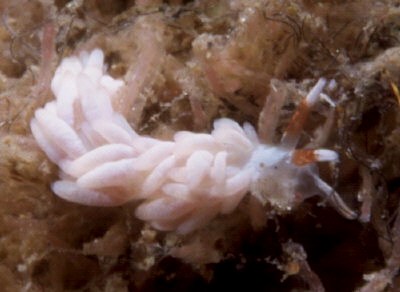

Cuthona sp. 5
Order: NUDIBRANCHIA
Suborder: AEOLIDINA
Family: Tergipedidae
PHOTO
Bassin d'Arcachon, south-west Atlantic coast of France, near Bordeaux.
Depth 10 m.
Upper Photo: Size 10 mm. October 31, 1998
Lower Photo: Size 12 mm. September 18, 1999
Photos: Michel Barrabés
See message below.
Authorship detailsRudman, W.B., 2000 (July 18) Cuthona sp. 5 [In] Sea Slug Forum. Australian Museum, Sydney. Available from http://www.seaslugforum.net/find/cuthsp5
Related messages
Re: Cuthona sp. 5
March 24, 2001
From: Juan Lucas Cervera
Hi Bill and Bernard:
Concerning the recent discussion about this species. When I first saw this picture it reminded me of a video-record I took of a Cuthona sp from the Strait of Gibraltar that had the same color pattern as Michel's animal. However, later I began to doubt if it was really an extreme color variation of C. gymnota. I only have seen 1 specimen with this exact colour pattern. If it definitely is an undescribed species, it supports the idea of those, like me, that think that all is not known in the Mediterranean yet.
Cheers.
Lucas.
lucas.cervera@uca.es
Cervera, J.L., 2001 (Mar 24) Re: Cuthona sp. 5. [Message in] Sea Slug Forum. Australian Museum, Sydney. Available from http://www.seaslugforum.net/find/4026Re: Cuthona sp. 5
March 20, 2001
From: Bernard Picton
Hi Bill,
I see there is a suggestion that this animal may be Cuthona gymnota. I'm certain that it is not, in fact I'm sure it is none of the Cuthona's I've ever seen in the Northeast Atlantic. It has the proportions of what I'd call a typical Cuthona (Trinchesia) like most of the species in this part of the world, eg. C. amoena or C. rubescens. I tend to think of the cerata as cigarette-shaped rather than cigar-shaped and the rhinophores and oral tentacles are relatively long and gently tapering. In C. gymnota the rhinophores and oral tentacles don't have white surface pigment and are colourless or tinged with orange. The rhinophore and oral tentacle pigmentation in these species is usually a reliable character in my experience. If Juan Lucas doesn't know it from the Mediterranean then it is probably a new species as he says in his earlier message.
I still use Catriona for this species as it seems different to the other
British species of Cuthona in a number of ways and has a distinctive radula. I've sent two pictures of Cuthona gymnota in a separate message.
Bernard
bernard.picton.um@nics.gov.uk
Picton, B.E., 2001 (Mar 20) Re: Cuthona sp. 5. [Message in] Sea Slug Forum. Australian Museum, Sydney. Available from http://www.seaslugforum.net/find/3997Thanks Bernard,
Bill Rudman
Cuthona sp. 5
March 14, 2001
From: Erwin Koehler
Dear Bill,
Michel Barrabés has identified Cuthona sp. 5 as Catriona gymnota, confirmed by Juan Lucas Cervera. There is only one little problem: is it placed in the genus Catriona or Cuthona?
Erwin
Erwin@medslugs.de
Koehler, E., 2001 (Mar 14) Cuthona sp. 5. [Message in] Sea Slug Forum. Australian Museum, Sydney. Available from http://www.seaslugforum.net/find/3961Dear Erwin,
Catriona and Trinchesia have been considered synonyms of Cuthona for about 20 years. As more species became known, the defining differences between the genera began to blur into one another.
I would be grateful for some feedback from other Forum Participants on whether Cuthona sp. 5 is indeed Cuthona gymnota. One obvious feature of Cuthona sp. 5 are the rhinophores with their wide median orange band and the opaque white tip. As far as I can determine, in Cuthona gymnota the tip of the rhinophores is not pigmented. However I am not an expert on these Atlantic species so any comments are welcome.
best wishes,
Bill Rudman
Re: Cuthona? from France
July 27, 2000
From: Juan Lucas Cervera
Dear Bill,
Three years ago I found one specimen, like that from Michel's photograph, at the Bay of Algeciras (Strait of Gibraltar). Their coloration resembles in some aspects the Mediterranean species called by Schmekel Cuthona maua (I'm not convinced that the true maua from Brazil is the same species than in the Mediterranean), but is definitively different. So, I think probably we would have in front of us another small undescribed aeolid species from Europe.
Cheers.
Lucas.
lucas.cervera@uca.es
Cervera, J.L., 2000 (Jul 27) Re: Cuthona? from France. [Message in] Sea Slug Forum. Australian Museum, Sydney. Available from http://www.seaslugforum.net/find/2775Thanks Lucas,
Bill Rudman.
Cuthona? from France
July 25, 2000
From: Erwin Koehler


Dear Bill,
This one is from the Bassin d'Arcachon, at the south-west Atlantic coast of France, close to Bordeaux. depth 10 m. both during nightdives.
Photos by Michel Barrabés
Email: m.barrabes@libertysurf.fr
Upper Photo: Size 10 mm. October 31, 1998
Lower Photo: Size 12 mm. September 18, 1999
Erwin
Medslugs.Koehler@t-online.de
Koehler, E., 2000 (Jul 25) Cuthona? from France. [Message in] Sea Slug Forum. Australian Museum, Sydney. Available from http://www.seaslugforum.net/find/2737Dear Erwin,
This looks like a species of Cuthona, or at least a teripedid. The orange band on the rhinophores and the white streak on the oral tentacles look fairly distinctive but I am afraid I can't identify it.
Hopefully it is familiar with one of our European colleagues.
Best wishes,
Bill Rudman.
